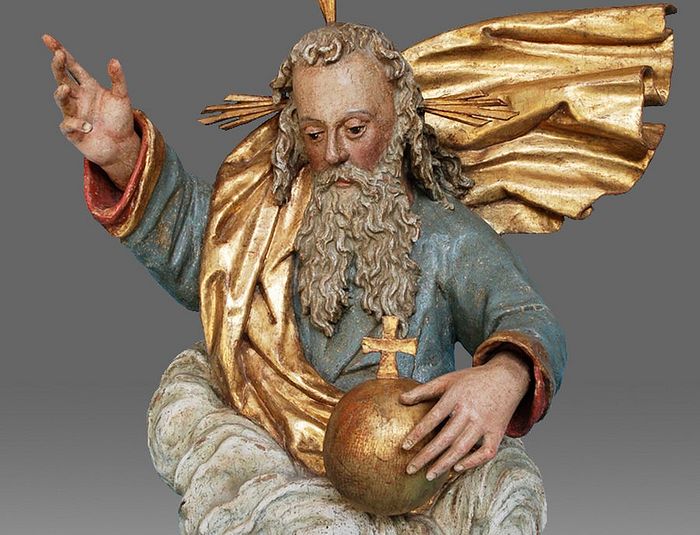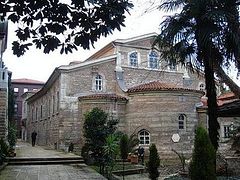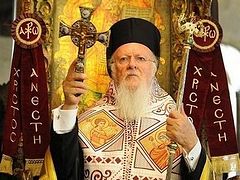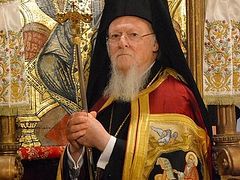 Roman Catholic Sculpture, God the Father. Photo: kunsthandel-puch.de
Roman Catholic Sculpture, God the Father. Photo: kunsthandel-puch.de
The Bishop of Istanbul (the city, or rather, the area that once upon a time used to be the capital of the “ecumene,” which means the inhabited earth) is curiously persistent in calling himself “ecumenical,” as if Istanbul were still the capital of the Byzantine or, even, the Ottoman Empire. Since it is not, his status should return to that of a suffragan Bishop, as it was before St. Constantine the Great moved the capital of the Roman Empire in 330 AD to where the town of Byzantium used to be. Curiously, world Orthodoxy continues to give the occupant of the once upon a time capital of the world the same honorary title of “Ecumenical Patriarch.” He is no longer the Ecumenical Patriarch (referred to as EP hereafter), and everybody knows it, except for the occupant, who continues to live in the glories of the past.
Patriarch Bartholomew speaks and acts as if he were the absolute monarch of world Orthodoxy - and beyond. His brethren Bishops have tolerated him, and accepted him to be, honoris causa, the head of one of the 14 autocephalous Churches, and “first among equals” - always understood as first in honor. But he is not satisfied with this honorific title. Even though only a few thousand faithful live in the historical territory of the Patriarchate, he claims the entire universe as his jurisdiction. He has convinced the Church of Greece to cede all its churches abroad to him, and demands the same from all jurisdictions, as if belonging canonically to him.
Let’s see what basis the Bishop of Istanbul, formerly Constantinople, justifies his inherited privileges. The Second Ecumenical Council (381) in its 3rd Canon elevated the status of the Bishop of the capital of the Roman Empire:
“Let the Bishop of Constantinople have the privileges of honor (τὰ πρεσβεῖα τῆς τιμῆς) after the Bishop of Rome, because of its being the New Rome.”1
The Fourth Ecumenical Council of Chalcedon (451) confirmed in its Canon 28 that,
“as the throne of the Old Rome was granted privileges on account of being the imperial capital, so also the most holy Church of Constantinople has the same privileges (τὰ ἶσα πρεσβεῖα) on account of being the seat of the Empire, and following second after her.”2
These privileges were restated once more in 692 by the 36th Canon of the Quinisext Council.3 One thing is crystal clear: the See of Constantinople was elevated to its exalted position on account of being the capital of the Empire. Crystal clear? Not to the EP!
It would help us to understand his thinking if we consider the following: Pope Leo, who was Bishop of Rome at the time of the Fourth Ecumenical Council, did not accept its 28th Canon. Why? Because, following his predecessors, he did not base the primacy of the Bishop of Rome on being Bishop of the capital of the Empire, but because he was the successor of Peter, the founder of the Church of Rome, who was the first among the Apostles. The Popes have never seen themselves as first in honor, but as absolute first. We all know that. But what of the occupant of the “throne” of the New Rome? How can he justify the special privileges of the once upon a time capital of the Byzantine Empire? Leave it to his pride, the new Archbishop of America Elpidophoros. In a study he wrote in 2014 entitled, “First Without Equals: A Response to the Text on Primacy of the Moscow Patriarchate” he stated:
In the long history of the Church, the presiding hierarch of the universal Church was the bishop of Rome. After Eucharistic communion with Rome was broken, canonically the presiding hierarch of the Orthodox Church is the archbishop of Constantinople.4
The EP, according to the Canons, was equal to the Bishop of Old Rome. But since the Great Schism (1054) he took the Pope’s place, inheriting all his privileges, and left him sine paribus, without equals! So simple. Not a word about the erroneous teaching of the Roman Church about the primacy of the Pope, which was the main cause of the Great Schism!
But this was not enough. The EP had to justify his absolute primacy not only historically, but theologically. And he did, again with Elpidophoros’ help. In 2014 he wrote a study entitled, “First Without Equals: A Response to the Text on Primacy of the Moscow Patriarchate.”5 In it he counters a statement of the Synod of the Moscow Patriarchate entitled, “Position of the Moscow Patriarchate on the problem of primacy in the Universal Church.”6
His study itself is without equal! In it he argues that as God the Father is first among the three persons of the Holy Trinity, so one Bishop needs to be first among the Bishops. Therefore his primacy is not honorific but absolute.
This position was not entirely new. He had addressed it on March 16, 2009 in a lecture he had given at the Chapel of Holy Cross Theological School in Boston when he was Archimandrite and Chief Secretary of the Holy and Sacred Synod, It was titled, “Challenges of Orthodoxy in America and the Role of the Ecumenical Patriarchate.” In it he had stated:
[T]he refusal to recognize primacy within the Orthodox Church, a primacy that necessarily cannot but be embodied by a primus (that is by a bishop who has the prerogative of being the first among his fellow bishops) constitutes nothing less than heresy. It cannot be accepted, as often it is said, that the unity among the Orthodox Churches is safeguarded by either a common norm of faith and worship or by the Ecumenical Council as an institution. Both of these factors are impersonal while in our Orthodox theology the principle of unity is always a person. Indeed, in the level of the Holy Trinity the principle of unity is not the divine essence but the Person of the Father (“Monarchy” of the Father), at the ecclesiological level of the local Church the principle of unity is not the presbyterium or the common worship of the Christians but the person of the Bishop, so too in the Pan-Orthodox level the principle of unity cannot be an idea nor an institution but it needs to be, if we are to be consistent with our theology, a person.7
As we see, the special privileges the EP has are no longer based on the Canons of the Church, but on this new theory. In his zeal to elevate the EP’s universal primacy he advanced it to new heights. He attempts to support it on a theological basis, by recurring to a Roman Catholic argument called analogia entis (analogy of being). There is an analogy, or correspondence, he claims, between the EP and God the Father! As God the Father is the origin of the other two divine persons (“monarchy” of the Father) so the source of unity among the primates of the Church is a person, not a synod. That person is the Ecumenical Patriarch!
However, according to the Fathers of the Church, we are not allowed to draw conclusions from what we know about God to the order of created things and from the relations of the divine Persons to the relations of humans. The divine personal relations cannot and should not be reflected in the administrative structure of the Church. Apostolic Canon 34 presents the harmony that should exist between the first in honor and the many, always acting consensually and cooperatively, something most Bishops tend to ignore.8
In what may be the last Orthodox statement by an Ecumenical Patriarch, the Declaration issued by Patriarch Anthimos VII and his Synod in August 1895, criticizes Pope Leo’s XIII encyclical Praeclara gratulationis publicae (On the Reunion of Christendom):
...such a was the ancient church polity; and the Bishops were independent from each other and free entirely, each within his own borders, obeying only the synodal orders, and sat as equal to each other in the synods; and none of them claimed monarchical rights over the entire Church; but if a few Bishops of Rome ever raised arrogant demands of an absolutism unknown to the Church, they were checked and disciplined appropriately.”9
The “Pope of the East” must be checked and disciplined appropriately, who, as we have pointed out acts and behaves as absolute monarch without equals. We see that, on his own personal volition (motu proprio), acting as the Pope of the East, Patriarch Bartholomew has brushed aside the heads of the other autocephalous Churches, entering into communion with schismatic and anathematized bishops, even granting them autocephaly, and forming a Church recognized by only two other autocephalous Churches. If this state persists, and he does not change course, the Pope of the New Rome may find himself cut off from the communion of the Orthodox Church, as was the Pope of the Old Rome.
Used with permission.




